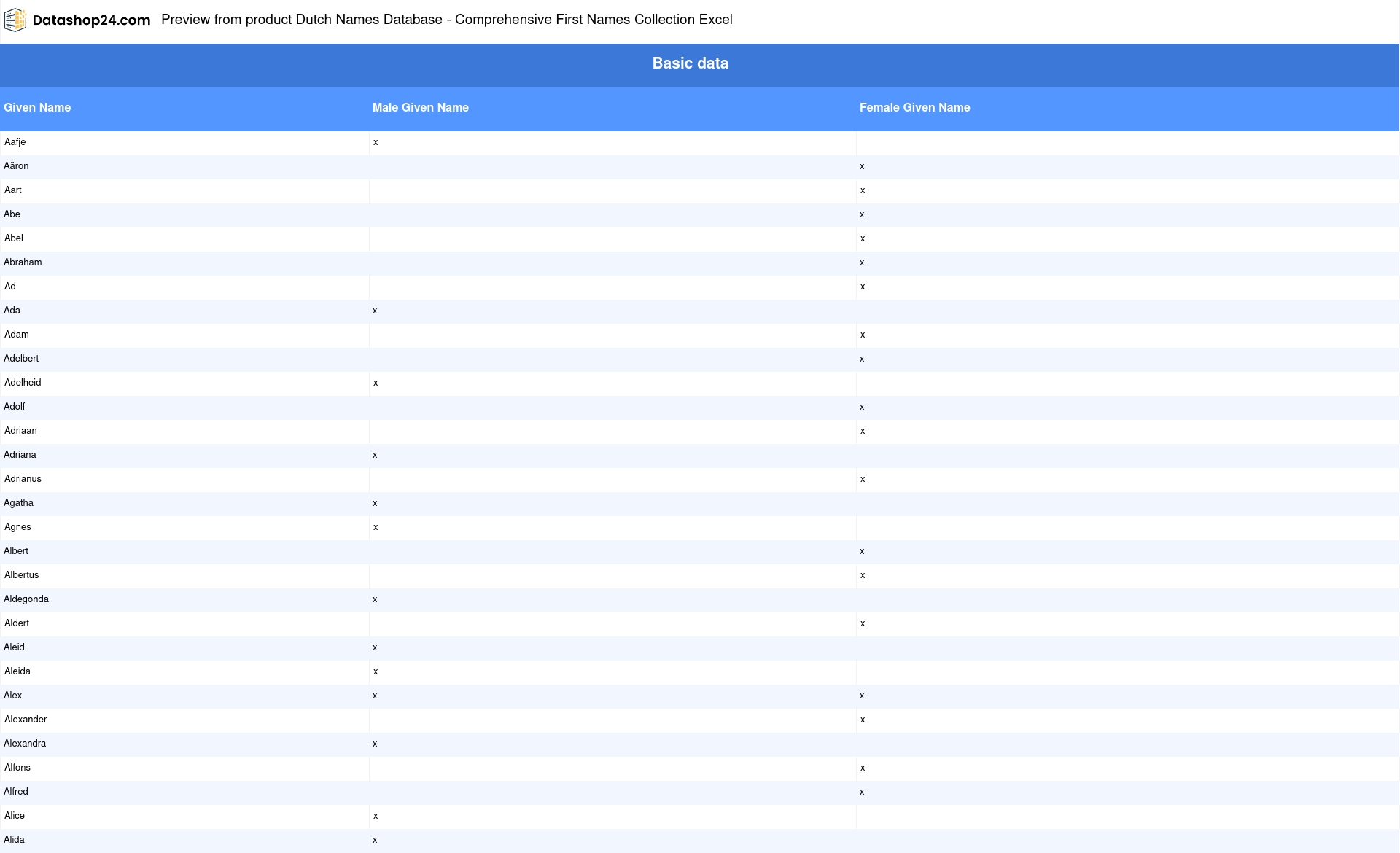Dutch Names Database - Comprehensive First Names Collection Excel
Essential Database Information for Dutch Names






 Up-to-date and carefully verified data
Up-to-date and carefully verified data Company-wide unlimited usage period
Company-wide unlimited usage period No waiting, immediate access after purchase
No waiting, immediate access after purchaseComprehensive Dutch Names Database with Gender Classification
Our Dutch names database contains 956 carefully curated first names from the Netherlands with precise gender classification. Each entry includes the first name and its corresponding gender designation (male, female, or unisex), providing you with essential data for various applications. The database is delivered in Excel format, making it easy to filter, sort, and integrate into CRM systems, marketing tools, or other databases. Whether you're developing software applications, conducting demographic research, or creating personalized marketing campaigns, this structured dataset offers reliable reference data for Dutch male names and Dutch female names.
The following table provides an overview of the database structure and content:
Basic data
Advantages of Purchasing Our Dutch Names Database
Acquiring a ready-made Dutch names database offers significant advantages over conducting your own research, particularly when dealing with the nuances of Dutch naming conventions and regional variations. Here are the key benefits of our professionally compiled dataset:
- Time-saving efficiency: Researching and compiling Dutch boy names and Dutch girl names from various sources can take weeks or months. Our database provides immediate access to a comprehensive collection from the Netherlands and Dutch-speaking regions.
- Cultural accuracy: Dutch names follow specific linguistic patterns and cultural traditions. Our database includes authentic Dutch names that reflect proper naming conventions, historical influences, and modern Dutch preferences.
- Gender classification reliability: Determining gender classification for Dutch names requires expertise in Dutch linguistics and cultural contexts, especially for names with similar endings or those with regional variations.
- Structured data format: The Excel format allows for immediate integration into your existing systems without additional formatting or data cleaning requirements.
- Regional representation: Our database includes Dutch names from different periods and cultural influences, reflecting the evolution of naming practices in the Netherlands and Flemish regions.
- Quality assurance: Each entry undergoes validation processes using modern algorithms and cultural verification to ensure accuracy and authenticity.
Useful Information and Frequently Asked Questions about Dutch Names
What does van mean in Dutch names?
"Van" in Dutch names typically means "from" or "of" and traditionally indicates geographic origin or nobility. While primarily used in surnames like "van der Berg" (from the mountain) or "van Amsterdam" (from Amsterdam), understanding this prefix helps appreciate Dutch naming heritage and family connections to specific places or regions.
What are popular Dutch boy names?
Popular Dutch boy names include both traditional names with Germanic roots and contemporary choices. Examples include Willem, Jan, Pieter, Daan, Bram, Lars, and Thijs. These Dutch male names often reflect the country's Protestant heritage, royal traditions, or modern international influences while maintaining distinctly Dutch characteristics.
What are popular Dutch girl names?
Popular Dutch girl names encompass classic choices with historical significance and modern options reflecting contemporary trends. Examples include Emma, Anna, Sophie, Lotte, Mila, Julia, and Evi. These Dutch female names often have elegant sounds and may show influences from neighboring countries while maintaining Dutch linguistic patterns.
Fascinating Facts About Dutch Names
Dutch naming traditions reflect a fascinating blend of Germanic roots, Protestant influences, and maritime history spanning centuries. Many Dutch names derive from Old Germanic elements, often related to strength, protection, or noble qualities. During the Dutch Golden Age, biblical names became extremely popular due to Protestant influences, while the country's global trade connections introduced international elements. Interestingly, the Netherlands has specific naming laws requiring names to not harm the child's welfare and to clearly indicate gender. Traditional Dutch naming patterns often honored grandparents in specific orders, creating family naming cycles that preserved heritage across generations. The influence of the Dutch royal family, particularly Queens Wilhelmina, Juliana, and Beatrix, significantly shaped naming trends throughout the 20th century. Regional variations exist between the northern and southern Netherlands, with some areas showing Frisian influences and others reflecting Catholic versus Protestant traditions. Modern Dutch parents increasingly choose shorter, internationally recognizable names while still appreciating traditional Dutch names with historical significance. The Dutch language's unique pronunciation rules mean that many Dutch names have distinctive sounds that reflect the country's linguistic heritage and cultural identity.






 Up-to-date and carefully verified data
Up-to-date and carefully verified data Company-wide unlimited usage period
Company-wide unlimited usage period No waiting, immediate access after purchase
No waiting, immediate access after purchase







